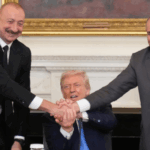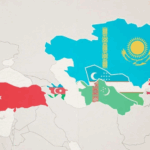Syria stands at a political crossroads. Beyond physical reconstruction, the future of the Syrian state depends on whether it can craft a constitutional framework that reconciles its deep ethnic, sectarian, and linguistic diversity. In this respect, Iraq’s post-2003 experience offers a cautionary tale and a partial blueprint, offering valuable lessons for Turkey as well.
In Iraq, Turkmens form a recognized ethnic group, concentrated in Kirkuk, Tal Afar, Tuz Khurmatu, and Diyala. When Iraq rebuilt its political system after the fall of Saddam Hussein in 2003, Turkey had both the leverage and the motive to ensure the recognition of the Turkish language alongside Arabic and Kurdish in the new constitution. Kirkuk — a city Ankara has repeatedly called “Turkish” — was home to a large Turkmen population. Yet despite historic ties, strategic interest, and active engagement in Iraq’s political transition during and after its invasions by the US, Turkey failed to secure constitutional language rights for Turkmen. Arabic and Kurdish became Iraq’s official languages; Turkish was excluded. The Iraqi Constitution of 2005 recognizes Arabic and Kurdish as national official languages, while) recognizing Turkmen as an official minority language (along with Syriac). According to Article 4 of the Iraqi Constitution, Turkmen is an official language in administrative units where Turkmen form a majority. This gives Turkmens the right to education and media in their own language in their regions. In areas with a sizable Turkmen population, primary and sometimes secondary schools offer education in Turkmen Turkish under Iraq’s minority-language rights framework. The language Iraqi and Syrian Turkmen speak is very close to Anatolian Turkish, especially the dialects of Anatolia’s south. Some scholars describe it as a dialect of Turkish rather than a separate language. While some describe it as an old version of the Turkish language, called the Turkmen language.
Turkey could have done far more to secure robust political, administrative, and cultural rights for Iraqi Turkmens. Unlike the Kurds, who institutionalized broad autonomy and constitutional guarantees, or Arabs, who retained central dominance, Turkmens were left with fragile protections and little structural representation. In other words, the post-2003 political settlement left the Turkmen community marginalized, as Ankara’s failure to secure Turkish as a co-official national language and other rights in Iraq severely constrained its cultural and political influence—most notably within the Kurdistan Region.
Today, in post-war Syria’s emerging political order, Turkey has a second chance to avoid repeating that mistake. If Turkey can secure recognition of Arabic, Kurdish, and Turkish as official national languages, it can both protect the Turkmen minority and embed long-term influence in a strategically vital state.
Syrian Turkmens: Historical Roots, Geography, and Identity
Syria is an ethnically and linguistically diverse country. Arabs make up the majority, but Kurds are the largest ethnic minority, with pre-war estimates ranging between 5% and 10% of the population — roughly 1.1 to 2.3 million people. The majority of Syrian Kurds are originally Turkish Sunni Kurds who have crossed the border during different events in the 19th and 20th centuries. A significant proportion of Syrian Kurds maintain strong cultural and linguistic ties with Turkey. Some families, especially those whose origins trace back to cross-border migrations in the late Ottoman and early Republican periods, still speak Turkish alongside Kurdish in daily life. Several prominent Kurdish political figures—including Saleh Muslim, co-founder of the PYD/YPG—were educated in Turkey and are fluent in Turkish. This shared linguistic and educational background underlines how Syria’s Kurds, despite their demands for autonomy, remain historically intertwined with Turkey in ways that distinguish them from Kurdish populations in Iraq or Iran.
Turkmens are the second largest minority in Syria. Pre-war estimates of Turkmens ranged widely, from several hundred thousand to over a million, due to assimilation and the lack of official census data. They trace their presence to successive waves of Turkic migration and settlement beginning with the Seljuks, consolidated under the Mamluks, and later institutionalized through Ottoman administration and military colonization. Over centuries, they became an inseparable part of Syria’s demographic mosaic, particularly in the northern and coastal regions. Communities were established in Aleppo’s hinterlands, across the fertile plains of Homs and Hama, along the Euphrates corridor near Raqqa, and most iconically, in the mountainous belt of Latakia’s Jabal al-Turkman, a rugged highland that still bears their name. This geography made them both borderland custodians and intermediaries between Anatolia and the Levant.
The assimilation faced by Turkmens accelerated under Ba’athist rule, when the ideology of Arab nationalism actively discouraged minority languages and cultures from being expressed in public. Like the Kurds and other non-Arab groups, Turkmens were pushed to adopt Arab identity markers in schools, bureaucratic records, and official life. The Syrian state’s refusal to acknowledge ethnic minorities in its census meant Turkmen identity survived mostly in private—spoken at home, kept alive in family traditions, but invisible in the public sphere. Many Turkmens registered themselves as Arabs for pragmatic reasons, whether to avoid discrimination in education and employment or to secure access to state services.
Despite these assimilationist pressures, Turkmen communities found ways to preserve distinctive elements of their heritage. In rural enclaves, dialectal Turkish speech, religious festivals, and clan traditions reinforced continuity. In cultural practices—from cuisine to oral poetry—Turkmen identity survived beneath the surface, even as official discourse erased it. The difference between urban assimilation and rural resilience created a layered pattern: while the identity of city-dwelling Turkmens became more fluid, those in borderland mountains and plains retained stronger linguistic and cultural self-identification.
Kurdish Question and The Risk of Repetition in Syria
The Kurdish population in Syria is primarily concentrated in Hasakah, northern Raqqa, and parts of Aleppo. Kurdish political movements, particularly the PYD/YPG, have consistently advanced demands for decentralization with meaningful local autonomy, the official recognition of Kurdish as either a national or regional language and full control over education policy in Kurdish-majority areas. Their vision closely mirrors the trajectory of Iraq’s Kurds, who, after 2003, achieved constitutional recognition of Kurdish as a co-official national language alongside Arabic, coupled with far-reaching autonomy for the Kurdistan Region. Syria’s Kurds seek a parallel arrangement, albeit a limited one, within a restructured unified Syrian state.
In April 2025, Kurdish political forces convened a conference of some 400 representatives to call for a “democratic and decentralized Syria” — a vision safeguarding territorial integrity while granting real autonomy over education, cultural affairs, and local security to communities across the country. In Suwayda, the Druze have voiced similar aspirations, demanding locally responsive governance to escape both Damascus’s neglect and the sectarian risks of opposition coalitions.
President Erdoğan’s reaction — calling the Kurdish plan a “dream” — was unusually measured. He avoided the familiar charges of “terrorism” or “separatism,” hinting at a strategic opening: Turkey might oppose ethnically defined federalism, but could support institutional decentralization framed in national, not ethnic, terms.
Still, a constitutional framework of this kind would have serious consequences for other minorities. If a future Syrian constitution were to recognize only Arabic and Kurdish as official languages, Turkmens—despite their long history and demographic presence—would be left without formal recognition. Such an outcome would echo the imbalance of the Iraqi model, where Turkmen linguistic rights are confined to certain local strongholds rather than given national status, effectively curbing both their cultural visibility and political representation.
In Iraq, Turkey has long positioned itself as the external guarantor of Turkmen rights. This has taken shape through funding for Turkmen schools and media outlets, diplomatic pressure to ensure fairer representation in Baghdad and local councils, and the strategic use of Turkmen identity politics to counterbalance Kurdish nationalist ambitions—especially in contested areas like Kirkuk. In this way, the Turkmen question in northern Iraq has functioned both as a matter of cultural responsibility for Ankara and as a geopolitical tool in a fiercely competitive landscape.
Yet despite its activism, Turkey’s influence during the 2005 constitutional negotiations proved limited. Ankara was unable to secure Turkish as a co-official national language alongside Arabic and Kurdish. This failure had lasting consequences. First, Turkmen language rights were confined to localized application, with no guaranteed role in national institutions, state administration, or higher education. Second, Ankara’s cultural presence in the Kurdistan Region—in urban centers such as Erbil, Duhok, and Sulaymaniyah—remained informal, expressed through cultural associations, schools, and media outlets, but never institutionalized in law. Finally, by missing the opportunity to embed linguistic rights in Iraq’s national framework, Ankara ceded long-term leverage to Kurdish parties, which consolidated dominance in the Kurdistan Region’s political discourse.
As a result, Turkey’s engagement with northern Iraq has been mediated less through durable constitutional guarantees and more through fluctuating economic and security ties. While trade, energy, and military cooperation have given Ankara significant weight in the Kurdistan Region, the absence of official national recognition for the Turkmen language has left Iraq’s Turkmen population vulnerable to marginalization. This gap has also weakened Turkey’s soft power strategy, reducing its ability to translate cultural affinity into political influence and ensuring that the balance of power in disputed territories like Kirkuk remains heavily tilted toward Kurdish and Arab actors.
The same pattern could easily repeat itself in Syria. If Turkish is not written into a future Syrian constitution as an official language, Turkmens there may end up in the same position as their Iraqi counterparts—acknowledged in local contexts but excluded at the national level. That would once again limit Turkey’s role, leaving it dependent on informal networks and economic leverage instead of binding constitutional guarantees. For a country aiming to build long-term influence in Syria and the region, failing to secure such recognition would mean falling into the very trap that has already weakened its position in Iraq.
Syria’s settlement process offers Turkey a rare second chance to avoid repeating the mistakes it made in Iraq. The parallels are evident: both countries contain sizeable Turkmen minorities alongside Arabs and Kurds, making language rights and political recognition essential to any lasting constitutional framework. Yet unlike in Iraq, Turkey now enjoys a far stronger position of leverage in Syria, particularly after playing a decisive role in the removal of Assad.
Turkey’s influence had already expanded within Syria even before the removal of Assad from power. Following military operations—Euphrates Shield, Olive Branch, and Peace Spring—Ankara established control over areas where its presence has been formalized through education and governance. The Turkish language has been introduced as a formal subject, and in some schools it serves as the primary medium of instruction. Curricula, textbooks, and teaching staff are supplied directly by Turkey’s Ministry of Education, while public signage and municipal administration increasingly feature Turkish alongside Arabic. Reports by the USCIRF (Syria 2025 Annual Report) and the EUAA (COI Syria) confirm that these policies intertwine humanitarian measures—such as rebuilding schools and paying teacher salaries—with deliberate soft power projection, embedding Turkish linguistic and cultural presence into Syria’s emerging governance structures. Since 2019, Turkey has organized voluntary returns to reconstructed housing in Jarablus, al-Bab, and Afrin. The return of Syrians has continued following Assad’s removal and is likely to accelerate further if Syria’s political and economic situation continues to improve.
This leverage also extends deep into the political arena, most visibly through Ankara’s sway over Ahmed al-Shara, the interim Syrian president. Al-Shara’s reliance on external backers to stabilize Syria’s fragile governance makes Turkey’s support indispensable, affording Ankara a direct channel to shape the constitutional agenda. By guiding the interim leadership, Turkey now has an opportunity to ensure that Turkish is not confined to a symbolic or peripheral role but instead institutionalized as an official language of the new Syrian state.
Refugees, Citizenship, Tourism: Turkey’s Soft Power
According to several reports, Turkey currently hosts around 3.6 million registered Syrian refugees. The majority of this population is Arab, though several hundred thousand are Turkmen, largely originating from Aleppo, Latakia, and Homs, while tens of thousands are Kurdish, primarily from Afrin and Kobani.
Years of residency in Turkey’s education system have reshaped the language profile of Syria’s refugee communities. Among the second generation—whether Arab, Kurdish, or Turkmen—Turkish has become widely spoken. For many children born in exile, it is now their main language of literacy. This prolonged exposure has not only eased their adaptation to schooling but also fostered broader social and economic integration. In many cases, Turkish has created a shared cultural ground that increasingly cuts across ethnic lines.
The influence of this trend can even be seen at the political level. Syria’s current Foreign Minister, Asaad Hassan al-Shibani, earned his master’s degree in International Relations at Istanbul Sabahattin Zaim University, where he wrote his thesis on “The Impact of the Arab Uprisings (2010–2020) on Turkey’s Foreign Policy Toward Syria.” His fluency in Turkish and deep familiarity with Turkish culture are widely seen as valuable assets for fostering closer ties between Damascus and Ankara.
Beyond Turkmen communities, the Turkish language has acquired growing prestige across the Arab world. Turkish television dramas rank among the most-watched programs in both Syria and Iraq, shaping popular culture and soft power influence. Years of pre-war Syrian tourism to Turkey created further cultural familiarity, while trade integration—even amid conflict—has reinforced the language’s practical value. In Syria, these dynamics are amplified by the integration of millions of refugees into Turkish society, the persistence of cross-border trade, and Turkey’s direct governance structures in the northwest. In this sense, institutionalizing Turkish within Syria’s national framework would not represent an artificial imposition but rather the formalization of an already emerging reality.
Turkey’s citizenship-by-investment (CBI) architecture has evolved rapidly since its launch in 2016. Eligibility was eased in 2018—most notably by lowering the property purchase threshold—before being tightened again in 2022, when the real-estate requirement was raised to $400,000. The impact was immediate. Foreigners’ share of Istanbul home sales surged, exceeding 12 percent in the post-CBI years, while naturalizations rose from just 14 in 2017 to 5,196 in 2019. Since its inception, an estimated 25,000 to 30,000 people have acquired Turkish citizenship through this program.
Alongside this investment track, a parallel channel of exceptional naturalizations has reshaped Turkey’s demographic landscape. By August 2024, some 238,768 Syrians had obtained Turkish citizenship outside of the CBI framework, sparking heated domestic debate. For the opposition—primarily the CHP, GP, and İYİ parties—CBI represents the commodification of citizenship, a rejection of republican principles that define citizenship as identity and obligation. Their critiques emphasize housing market shocks, security risks, and the dilution of national belonging. By contrast, the ruling AKP has defended CBI on pragmatic and utilitarian grounds, linking it to construction-led economic stimulus and external financing while carefully avoiding values-based justification. The MHP, though nationalist in doctrine, muted its criticism in practice due to coalition logic, while the DEM/HDP focused its objections on housing impacts and taxation rather than outright rejection.
The effects of these policies extend far beyond domestic politics. Large numbers of Arabs across the Middle East—including Iraqis, Palestinians, Jordanians, Libyans, Egyptians, and Gulf nationals—have obtained Turkish citizenship through property acquisition. Combined with high volumes of Arab travel to Turkey for tourism and medical services, particularly in the aesthetics industry, these flows have produced dense people-to-people networks. Within these networks, Turkish is increasingly valued not only as a prestige language but also as a practical one, used in family life, education, and business circles.
For Syria, the implications are profound. These pipelines of citizenship, mobility, and exchange are knitting Arabic and Turkish together well beyond Turkmen communities, embedding bilingualism and administrative familiarity into everyday life. Among Syrians, especially those who have lived, studied, or traded in Turkey, Turkish is no longer foreign but part of their lived social and economic reality. This constitutes the very social base required to justify the inclusion of Turkish in Syria’s national curriculum and its recognition as an official language.
Municipalism as a Framework for Regional Soft Power
No matter what governance model a new Syria ultimately adopts, Turkey should press for Turkish to be recognized as an official language alongside Kurdish and Arabic. As previously noted, a decentralized framework would serve Turkey’s long-term interests, particularly if a new constitution formally grants Turkish national status. Ankara could also draw on its own experience with municipalism to support this approach. Despite the flaws and political violations associated with Erdoğan’s rule, Turkey may—if negotiations in the second Kurdish peace process succeed—adapt such a framework in a more legally sound and politically balanced manner, potentially even enshrining it in a revised constitution.
By steering Syria toward a more uniform model of municipal governance—drawing inspiration from Turkey’s Law No. 6360—Ankara could help Damascus meet the local demands of its diverse communities while preserving the unity of the Syrian state. A reform of this kind would go beyond administrative efficiency: it could also enshrine three official languages—Arabic, Kurdish, and Turkish—reflecting Syria’s true demographic mosaic and granting long-denied cultural rights to millions.
The implications would reach far beyond Syria’s borders. Recognizing Turkish as an official language in a post-war constitution would embed Turkey’s presence into the very political fabric of a major Arab state, no longer confining its influence to Turkmen enclaves or frontier towns. Such an achievement would not only elevate Ankara’s regional credibility but also expand Arab–Turkish bilingualism across education, governance, and everyday life.
This shift would reinforce Turkey’s cultural footprint, which already thrives through refugee integration, cross-border trade, tourism, and even medical travel. With constitutional recognition, however, that soft power would acquire a new legitimacy—one backed by law rather than circumstance. In this sense, institutionalizing Turkish in Syria would not merely correct the oversight of Iraq’s post-2003 settlement but would also give Ankara a durable platform to consolidate its influence across the wider region.
By: GEOPOLIST – Istanbul Center for Geopolitics







